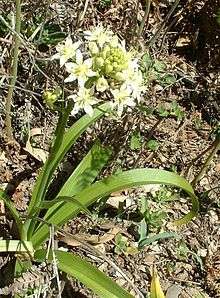Toxicoscordion fremontii
Toxicoscordion fremontii, known as the common star lily or Frémont's deathcamas (after John C. Frémont)[3] or star zigadene, is an attractive wildflower found on grassy or woody slopes, or rocky outcrops, in many lower-lying regions of California, southwestern Oregon, and northern Baja California.[1][4][5]
| Toxicoscordion fremontii | |
|---|---|
 | |
| Common star lily | |
| Scientific classification | |
| Kingdom: | Plantae |
| Clade: | Tracheophytes |
| Clade: | Angiosperms |
| Clade: | Monocots |
| Order: | Liliales |
| Family: | Melanthiaceae |
| Genus: | Toxicoscordion |
| Species: | T. fremontii |
| Binomial name | |
| Toxicoscordion fremontii | |
| Synonyms[1] | |
| |
Like other deathcamases, T. fremontii grows from a more or less spherical bulb, which in this species has a diameter of 20–35 mm. Its leaves can reach up to half a meter in length, but are typically half that length. They grow from the base of the plant. Flowers, which can be seen from March to June, grow in clusters. They have six petals (strictly, three petals and three very similar sepals), arranged symmetrically, giving rise to the name star-lily. Each flower is 1–4 cm across.[6]
References
- "Toxicoscordion fremontii", World Checklist of Selected Plant Families, Royal Botanic Gardens, Kew, retrieved 2012-04-22
- Tropicos search for Zigadenus glaberrimus
- Michael L. Charters. "Botanical Names: F". California Plant Names: Latin and Greek Meanings and Derivations. Sierra Madre, CA. Retrieved September 24, 2009.
- Calflora taxon report, University of California @ Berkeley, Toxicoscordion fremontii (Torr.) Rydb. Fremont's star lily
- Biota of North America Program 2014 county distribution map
- Flora of North America, Vol. 26 Page 85, Zigadenus fremontii (Torrey) Torrey ex S. Watson, Botany (Fortieth Parallel). 343. 1871 (as Zygadenus).
External links
- Jepson manual species treatment
- CalPhotos Photos gallery, University of California
- Santa Barbara Wildflowers, Toxicoscordion fremontii color photos and ecological information
| Wikimedia Commons has media related to Toxicoscordion fremontii. |